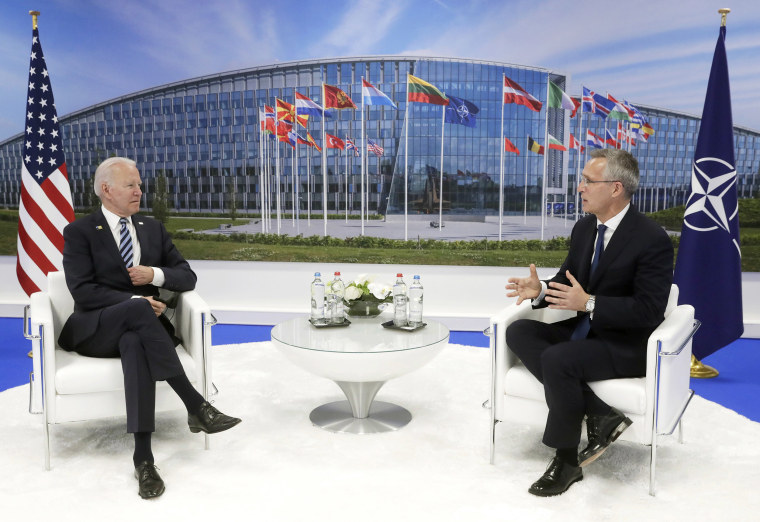GENEVA — President Joe Biden kicked off his first NATO summit as commander in chief Monday by reaffirming the U.S. support of the 72-year-old alliance as the group specifically called out the growing reach of China's military and ratcheted up concerns about Russian aggression.
"China’s growing influence and international policies can present challenges that we need to address together as an Alliance," the group said in a joint statement, called the communique, following the meeting. "We will engage China with a view to defending the security interests of the Alliance."
The group also issued strong language against Russia, saying the country "continues to breach the values, principles, trust, and commitments" of international agreements and that their military's aggression towards its neighbors "increasingly threaten the security of the Euro-Atlantic area and contribute to instability."
In a marked shift from predecessor Donald Trump’s criticism, who questioned NATO's relevance and chastised member's for not contributing more money to the alliance, Biden threw his full support behind the group. He called NATO’s Article 5 “a sacred obligation,” referring to the agreement that an attack on one is an attack on all and will be met with a collective response. He also referred to the days after the Sept. 11 terrorist attacks, saying, “NATO stepped up and they honored Article 5, and I just want all of Europe to know the United States is there, the United States is there.”
On China, the group said the country presents "systemic challenges to the rules-based international order" citing its assertive behavior in recent years, including the country's expansion of its nuclear arsenal. It also noted military cooperations between China and Russia.
"We remain concerned with China’s frequent lack of transparency and use of disinformation," the group said. "We call on China to uphold its international commitments and to act responsibly in the international system, including in the space, cyber, and maritime domains, in keeping with its role as a major power."
Biden has been urging world leaders during his series of meetings in Europe to increase their pressure on China. Following the Group of Seven meeting in the U.K. over the weekend, where the leaders called out China for its human rights abuses, China appeared to fire back saying that the days when "small" groups of countries decided the fate of the world are past.
The group also supported a new defense policy to address cyberthreats and ransomware, which it said are becoming more "complex, destructive, coercive, and becoming ever more frequent." The group said it would use the full range of its capabilities to counter such threats and said that they recognized that the impact of certain cyber activities might be "considered as amounting to an armed attack."
The U.S. and NATO members also addressed the withdrawal of troops from Afghanistan this year and how they and other partners “will continue supporting the people of Afghanistan through civilian and security assistance,” the White House said.
Biden's schedule Monday also included meetings with the leaders of Estonia, Latvia and Lithuania as well as Turkish President Recep Tayyip Erdoğan.
On Tuesday, Biden will participate in a summit with the European Union and then will travel to Geneva, Switzerland. In Geneva on Wednesday, Biden is planning to speak in person for the first time as president with Russian President Vladimir Putin, a pivotal meeting where Biden will likely address cyberattacks and Russian aggression in Ukraine, interference in U.S. elections and other threats.
White House officials have said that they hope Biden's meeting with the G-7 leaders followed by NATO will show a strong untied front behind Biden as he goes into his meeting with Putin.


